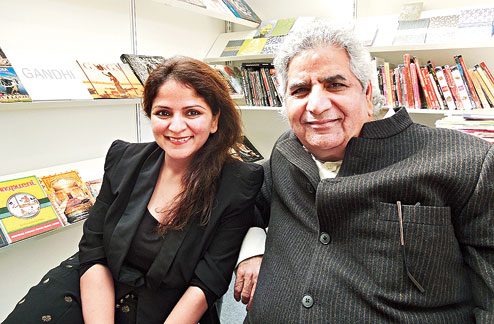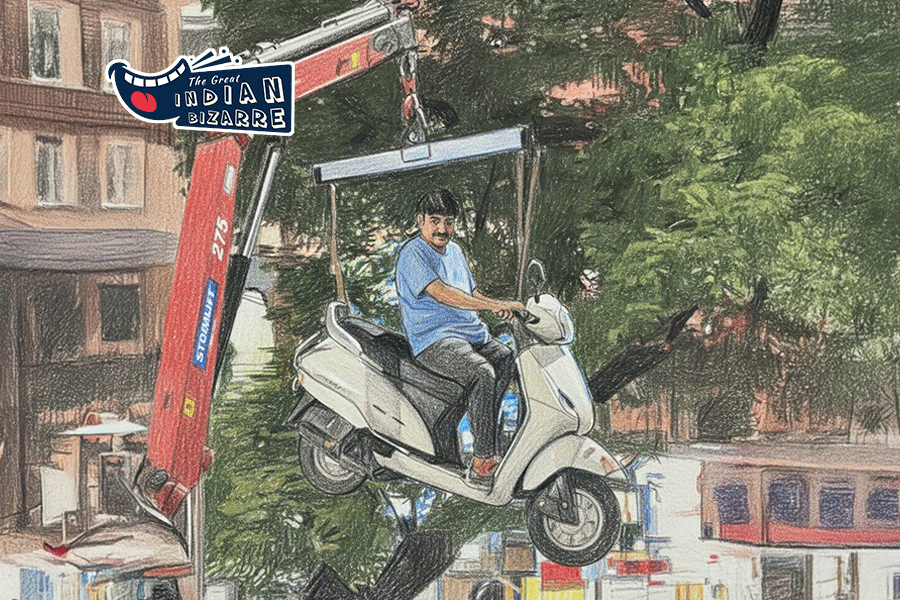Black and white and read all over

What Britain needs is someone who can make the trains run on time. Attempts to get to the London Book Fair were frustrated by British Rail "signal failures".
Executives from India huffed and puffed on the platform and tapped away on their mobile phones as one train after another from Clapham Junction to Kensington Olympia was cancelled. This is where the London Book Fair has moved from the Earls Court Exhibition Centre and taken even bigger premises.
It is always good to catch up with avuncular figures, such as Pramod Kapoor of Roli Books, who was accompanied by his daughter Priya. His illustrated books are of a high standard and he is especially proud of a new Ramayana he is bringing out.
He tells me of trends in Indian publishing - that online shopping is becoming more popular, people are writing more biographies and autobiographies and that book banning by the authorities or interest groups is not as prevalent as might sometimes appear from abroad.
Overseas buyers "come to us for art books - and cuisine is always a good seller," says Pramod, who effectively holds up a literary mirror to India.
He himself is reading deeply about Gandhi - "the most fascinating man in a long, long time". He also loved the autobiography of Tagore's niece, Sarala Devi Chaudhurani, called The Scattered Leaves of My Life: An Indian Nationalist Remembers .
"Gandhi himself admitted she almost broke his marriage," he adds.
Meanwhile, Priya, who has inherited her father's love of books, is developing "narrative non-fiction".
For example, she is publishing a book on Irani cafes, which tells of the Parsis and the history of dining, and another called Drama Queen , about 13 pre-1947 women in the performing arts.
At a personal level, she is reading Joanna Rakoff's memoir about working in a New York literary agency, The Salinger Years , and Aatish Taseer's The Way Things Were.
It clearly helps Indian publishing that there are so many bright women at the top.
History craze

The History Press is looking for a representative in India - I pass on this intelligence from Claire Beresford, international sales manager of the publishing house.
Two of its books I intend to read are The Final Over: The Cricketers of Summer 1914 by Christopher Sandford, and Sepoys in the Trenches: The Indian Corps on the Western Front 1914-15 by Gordon Corrigan.
At the I.B. Tauris stand, I meet an old acquaintance, Iradj Bagherzade, the company's chairman and publisher, and his managing director Jonathan McDonnell - they are bring out Churchill and the Islamic World, by Cambridge academic Warren Dockter.
Indians tend to dismiss Churchill as a "racist" but this fits oddly with the revelation that at one stage the great wartime leader considered converting to Islam.
At The Bookseller stand, Anna Martin, operations manager, was very generous - she gave me a whole pile of back and current issues of the trade journal, which is a treasure trove for journalists looking for stories about books.
There was an item about Faber bringing forward the paperback publication of Akhil Sharma's Family Life after the book won the £40,000 Folio Prize.
What is currently topping the charts are colouring books for adults by Scottish illustrator Johanna Basford. Her intricately drawn pictures of flora and fauna in Secret Garden has been followed by Enchanted Forest.
Matchmakers

Suman Bhargava's death in London last week, at the age of 76, ends an important link with the first generation of immigrants. I got the sad news from her son, Parag, who has for some years been running the marriage bureau his parents set up and been "responsible for bringing together more than 8,000 couples".
Parag's father, Ramesh, who was born in Lahore in 1935 and came to Britain in 1962, married Suman on December 12, 1964, and had two children, Parag and Purva.
Ramesh passed away in 2001 but when he started a marriage bureau in Southall, west London, on December 9, 1972 - the eighth anniversary of their first meeting - he named it after his wife.
What the Suman Marriage Bureau offered was stable marriage - it was not a dating service.
Mrs Bhargava took a dim view of three Indian girls who asked for three men, not for marriage, but to "take them out for the night". She briefed me about social changes in the Indian community. There were a few Englishmen who sought Indian brides; and one Indian girl who would marry only an Englishman.
In 2001, she told me of 30-something professional women, earning £40,000 to £50,000 a year, who found it hard to get prospective husbands earning as much or preferably more. One 27-year-old had the fatal disadvantage of being on £60,000 a year.
Nor did British-born and educated women want to import husbands from India. "They think there will be cultural problems."
But their marriage prospects slumped with age.
"Up to 25, it is possible; even up to 30," Mrs Bhargava would say. "At 35-plus, they have to agree to marry divorced or widowed men, a lot older and with children."
Cannes takes

The Cannes Film Festival poster is always much anticipated - this year, it honours the Swedish icon Ingrid Bergman, who was born on August 29, 1915.
For this year's festival, from May 13 to 24, I can't spot any Indian entries in "In Competition", but in the "Un Certain Regard" category, two are worth noting - Neeraj Ghaywan's Masaan (Fly Away Solo), starring Richa Chadda and Sanjay Mishra, and Gurvinder Singh's Punjabi language Chauthi Koot (The Fourth Direction).
Also, British director Asif Kapadia (of Senna fame) gets a special "Midnight screening" for Amy, a documentary on the late Amy Winehouse.
Meanwhile, in nearby Nice, there will be a formal inauguration of the exhibition, 8 Bengal Masters: Miracles of Existence, at the Musée des Arts Asiatiques, on May 18.
The masters include Paritosh Sen, Somnath Hore, Meera Mukherjee, Sarbari Roy Choudhury, Sanat Kar, Ganesh Haloi, Ganesh Pyne and Jogen Chowdhury.
And at the Venice Biennale in early May, Sundaram Tagore will establish himself as the world's number one Indian curator with his exhibition, Frontiers Reimagined, at the Museo di Palazzo Grimani, for which Prof. Nirmalya Kumar has very generously lent some Tagore paintings from his London collection.
It only remains for Mamata to send a big delegation to Cannes to fly the flag for Bengali cinema. My personal preference is for Raima's inclusion. She will make the French forget even their love affair with Aishwarya.
Poll prattle
All the polls and pundits are predicting a hung Parliament after the May 7 general election. Strictly from an Indian point of view, David Cameron would be best, but in the horse trading Ed Miliband might find it easier to form a minority government.
Tittle tattle
Lord Swraj Paul was unaware - until I pointed this out to him - that his idyllic 250-acre estate in Buckinghamshire has been used in the past as the location for Midsomer Murders, a detective series on ITV set among English village folk.
The series is in the news because it has just recruited its first Indian cast member - Sikh-origin actress Manjinder Virk will play pathologist Dr Kam Karimore.











